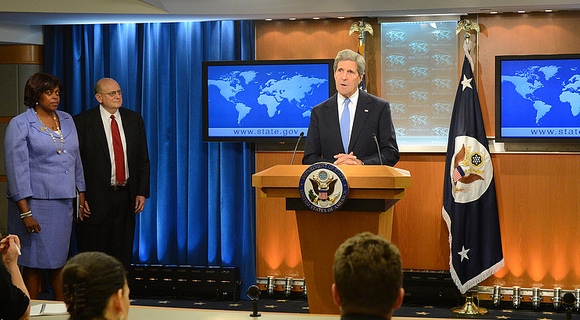On Monday, the U.S Department of State released its annual International Religious Freedom (IRF) Report for 2013. During the official release, Assistant Secretary of State Tom Malinowski, who was recently expelled from Bahrain after meeting with Shia opposition leaders, said the report would “pull no punches” with American allies, and the report is in fact quite critical of Bahrain’s violations of religious freedoms. Americans for Democracy and Human Rights in Bahrain (ADHRB) commends the State Department for the spotlight the IRF Report puts on violations of religious freedom around the world and for addressing Bahrain’s ongoing policy of discrimination towards its majority Shia population. The difference in treatment between Sunni and Shia Muslims in Bahrain was brought up in the report’s executive summary as a profile of government repression of religious freedom, specifically noting the “favored status” enjoyed by Sunnis in the country. From everyday discrimination in employment and government services to the targeting of Shia political leaders like Khalil al-Marzooq and the disbanding of the Islamic Ulama Council, a prominent committee of Shia clerics, the report outlines the many ways in which the island’s Shia population is consistently treated differently by the government. The report does mention the progress made on the rebuilding of religious sites demolished in the 2011 upheaval as a positive step taken by the government, noting that 10 of the 30 demolished buildings have been fully rebuilt. Yet this leaves out a key detail outlined previously by the U.S. Commission in International Religious Freedom’s (USCIRF) 2014 Annual Report that the Shia community actually paid for the rebuilding of 6 of the 10 buildings. Despite this omission, the report’s overarching criticism paints a picture of disparity experienced by many Bahrainis. The report’s section on Bahrain concludes by discussing the U.S. Government’s policy towards Bahrain’s violations of religious freedom, with an emphasis on dialogue between State Department and embassy officials and Bahraini government and civil society representatives. It is concerning that the Government of Bahrain seems to view the U.S. policy of conducting a dialogue with members of Bahraini civil society with considerable hostility as exemplified by their decision to expel Assistant Secretary Malinowski. ADHRB remains concerned that his expulsion demonstrates the Government of Bahrain’s continued efforts to stall the implementation of urgent and meaningful reforms. Religious freedom is closely tied to other basic human rights, and as such, must be one of the issues addressed by the Bahraini government to ensure that the country does not slide further into instability.
–
Matthew Starkston is an Advocacy Intern at ADHRB





